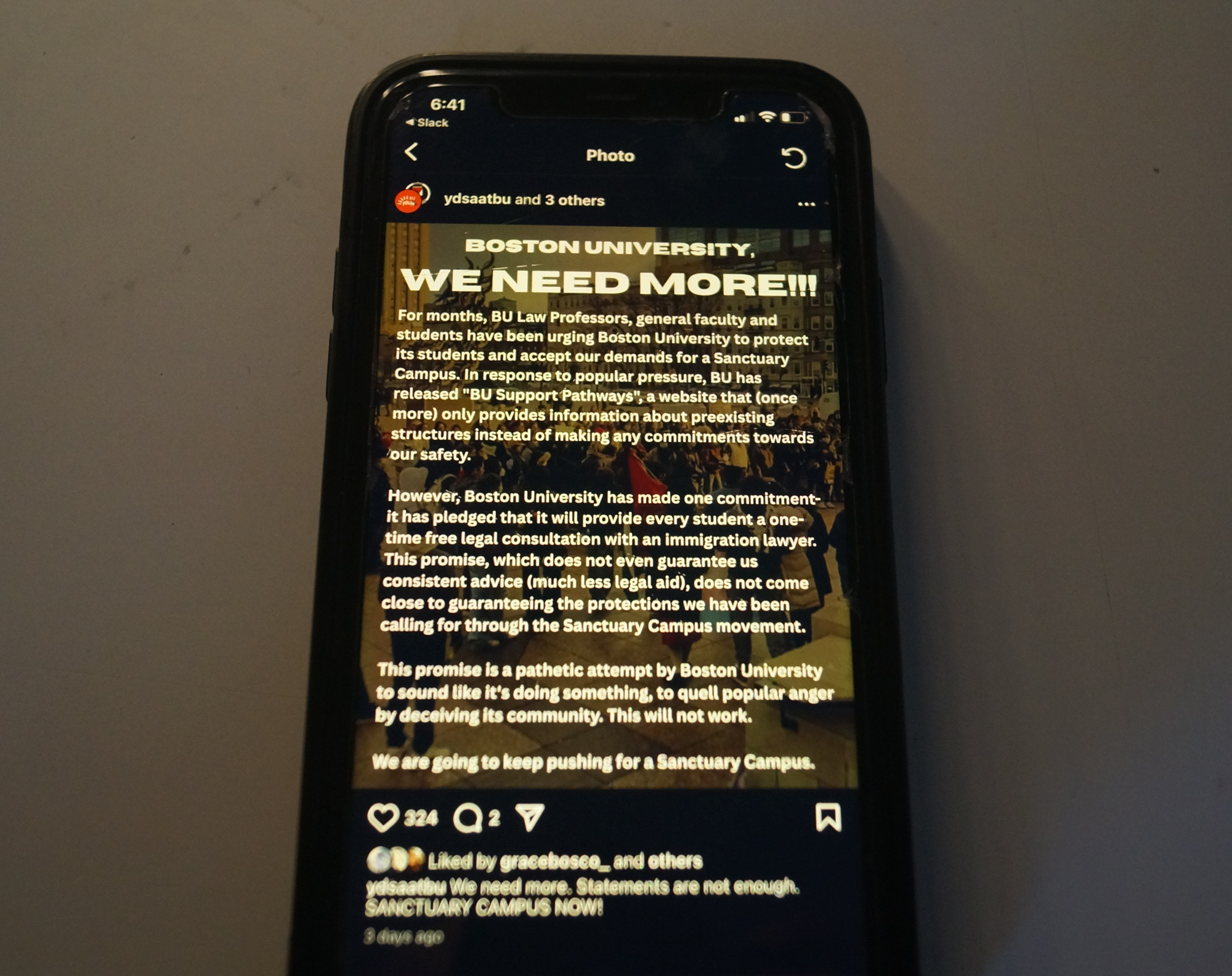Boston University President Melissa Gilliam introduced the Support Pathways Initiative, a resource hub to “support, inform, and guide the University’s global community,” in a University-wide email April 25.

“The strength of our community lies in our connections to one another and in upholding Boston University’s foundational values,” the email reads.
The initiative offers free, one-time, confidential consultations with an external immigration lawyer to eligible undergraduate students, graduate students, faculty and staff seeking guidance on their immigration status in the U.S.
Recent BU graduates within the immigration “grace period” — a period after the expiration of one’s immigration status during which an individual is still considered to be maintaining their status — are eligible for consultations. Recent graduates within an authorized optional practical training or academic training are also eligible for the service.
Consultations may address concerns of nonimmigrant visa revocation from the Department of State, termination of one’s Student and Exchange Visitor Program record, communication from the Department of Homeland Security regarding removal proceedings, any potential risks of reentering the U.S. following international travel and aid for immigration status.
Besides the free legal guidance offered by BU, the International Students & Scholars Office provided a list of private immigration attorneys and legal aid organizations, though consultations and legal services are not free.
These firms focus on F-1 student visa reinstatements, changes of immigration status and U.S. permanent resident applications, as well as cater toward employer or sponsor-based applications like the H-1, O-1, R-1 and P-1.
A collaborative Instagram post by BU Young Democratic Socialists, BU Prison Outreach Initiative, the Quinobequin Student Front for Palestine — formerly known as Students for Justice in Palestine — and BU Faculty and Staff for Justice in Palestine, called the initiative “pathetic.”
Maxi, who requested The Daily Free Press use a nickname to protect her identity, is a member of BU YDSA and said the initiative was “vague,” does not protect the student body and the one-time free legal consultation lacks consistent legal support.
“It’s not enough. It doesn’t make any commitments on the part of the school,” Maxi said. “There’s nothing new about it, it’s just rehashing old BU policy. Unless you count this new one-time free consultation … as doing something, it doesn’t do anything.
The hub also included resources for international students planning to stay on campus during the summer.
BU Spokesperson Colin Riley said students must have a valid visa or an extension of their optional practical training. Students currently living in University housing and planning to live in summer residences can transition directly to their summer rooms May 19, and then directly to their fall residence in August, as applicable.
Riley said further questions regarding study opportunities should be directed to a student’s ISSO advisor.
The hub says if students are approached by U.S. Immigration and Customs Enforcement on campus, they can contact the BU Police Department for assistance, which is working with the Office of the General Counsel to “address the request under the law.”
The hub said international students should carry a printed copy of their U.S. immigration documents, and officials will work to determine whether or not Customs Enforcement possesses a validly issued warrant or subpoena.
“Our demand is that they don’t let ICE on campus unless ICE has a judicial warrant,” Maxi said. “Because that’s when they absolutely legally have to.”
YDSA created a petition demanding the University establish itself as a sanctuary campus April 9.
A sanctuary campus means that BU does not cooperate with ICE or the DHS “to the greatest extent that is legally possible,” Maxi said.
Victoria Beharry, current secretary and upcoming co-president of BU Prison Outreach, wrote in an email to The Daily Free Press that the organization “appreciates” the legal services and immigration-related avenues offered by the University, but more work is needed.
“We think the University should strive to take more direct action to support its students,” she wrote. “BUPOI will continue to monitor the effectiveness of the BU Support Pathways Initiative and whether the initiative has a direct positive impact on students or whether it fails to fulfill its promises.”
Beharry said while she recognizes the University may be in a difficult position, an official statement guaranteeing the University will not cooperate with actions leading to the detention of students would be beneficial.
“Like all the other statements that BU has put out, it only provides information,” Maxi said. “It doesn’t make commitments, and what we need is commitments.”




















































































































